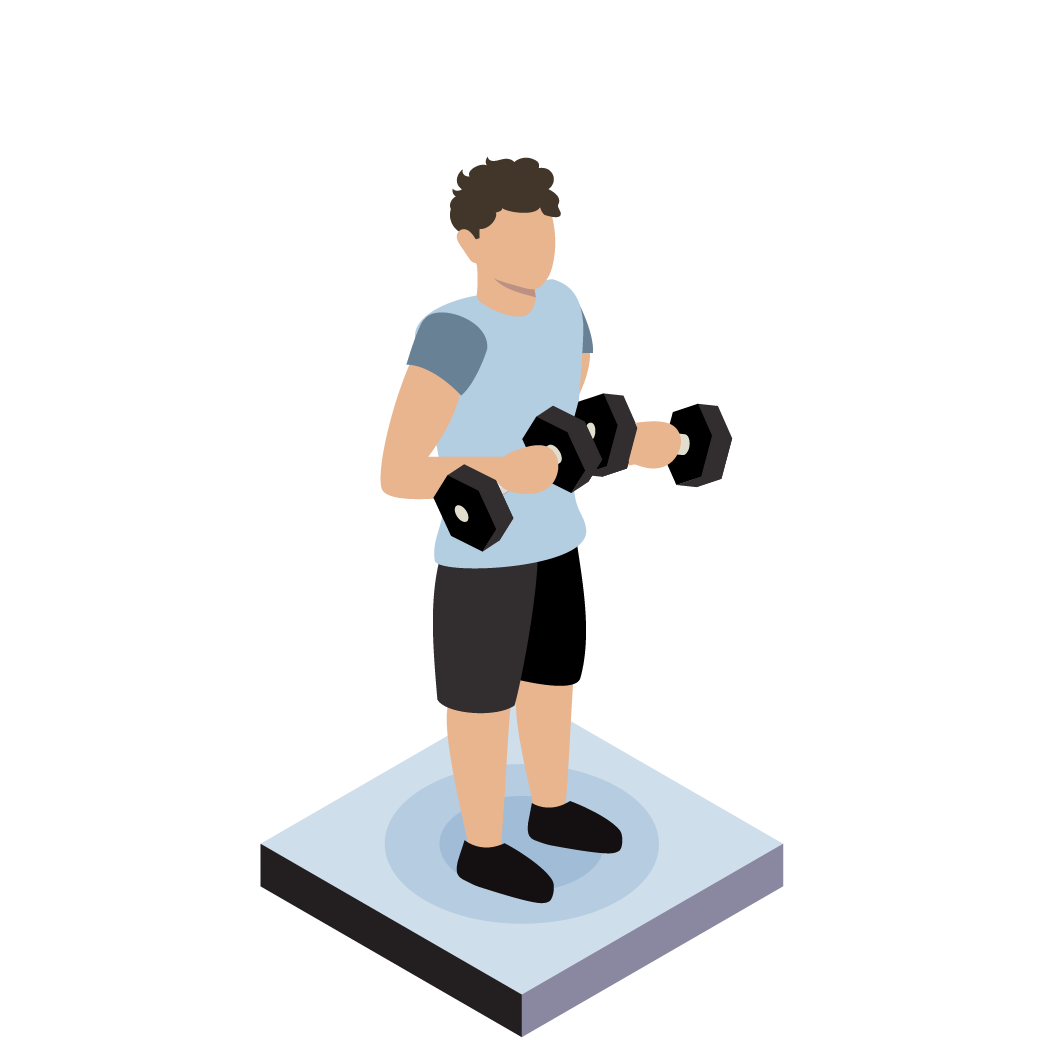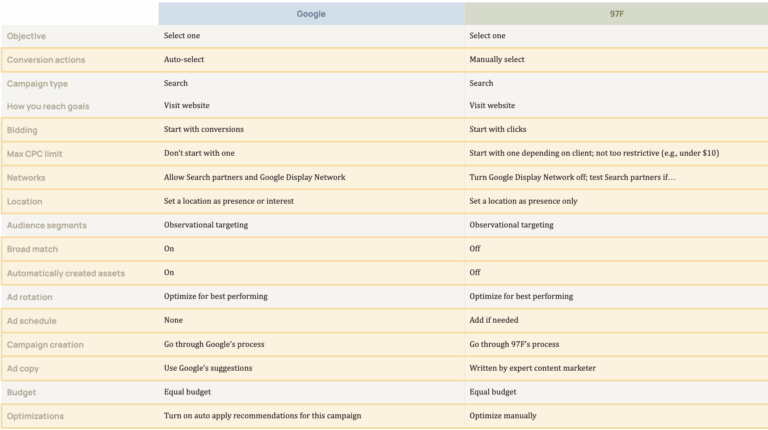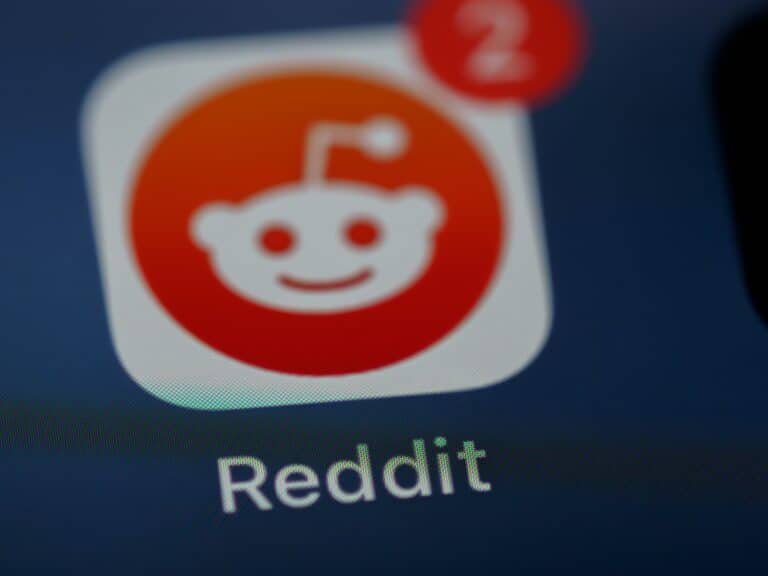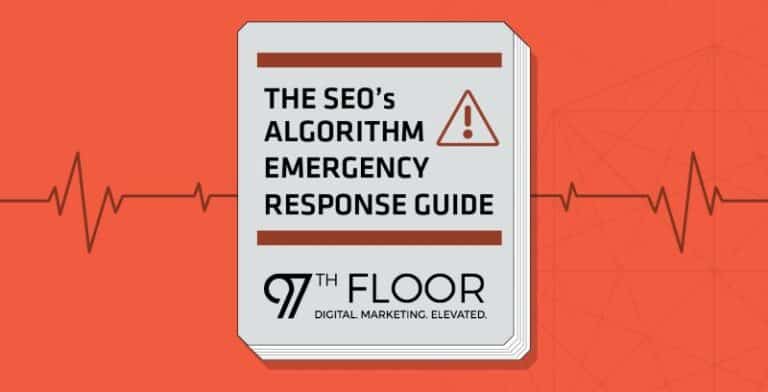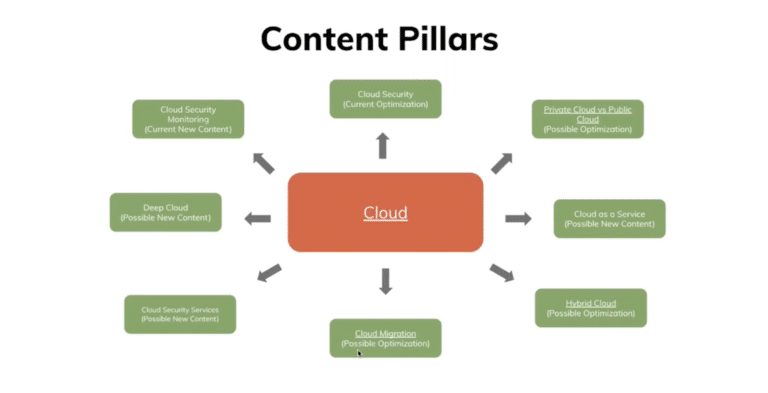Demographic and Psychographic Profiles
First things first — know your audience. Health enthusiasts span a variety of demographics and psychographics. Here are a few personas to consider as you plan your marketing strategy.
Millennials and Gen Z: This younger crowd is into holistic health and eco-friendly choices. They prioritize sustainable products and love exploring wellness apps and fitness tech. While they may sometimes float between different wellness apps, diets, or services, Millennials and Gen Zs will stay with brands that prove their value.
Urban Professionals: These busy individuals are typically in their 30s to 40s and are highly invested in efficiency and convenience. This group uses fitness apps or devices like smartwatches to track their health. They look for solutions that fit their fast-paced lifestyles—think healthy meal kits or quick fitness routines.
Active Retirees: Don’t overlook the older generation. Baby Boomers are more likely to engage in whole-body wellness, practicing activities like yoga or tai chi to stay active. They want to focus on mobility, longevity, and independence as they age.
Holistic Healers: This group leans toward natural remedies and mental health. They’re into mindfulness practices like meditation and enjoy sharing their experiences on social media. They value clean products and often search for supplements, herbal teas, and other natural
alternatives.
Curious to see how it all comes together? Here’s a real-life example of a health-enthusiast persona from 97th Floor.
Millennials and Gen Z: This younger crowd is into holistic health and eco-friendly choices. They prioritize sustainable products and love exploring wellness apps and fitness tech. While they may sometimes float between different wellness apps, diets, or services, Millennials and Gen Zs will stay with brands that prove their value.
Urban Professionals: These busy individuals are typically in their 30s to 40s and are highly invested in efficiency and convenience. This group uses fitness apps or devices like smartwatches to track their health. They look for solutions that fit their fast-paced lifestyles—think healthy meal kits or quick fitness routines.
Active Retirees: Don’t overlook the older generation. Baby Boomers are more likely to engage in whole-body wellness, practicing activities like yoga or tai chi to stay active. They want to focus on mobility, longevity, and independence as they age.
Holistic Healers: This group leans toward natural remedies and mental health. They’re into mindfulness practices like meditation and enjoy sharing their experiences on social media. They value clean products and often search for supplements, herbal teas, and other natural
alternatives.
Curious to see how it all comes together? Here’s a real-life example of a health-enthusiast persona from 97th Floor.
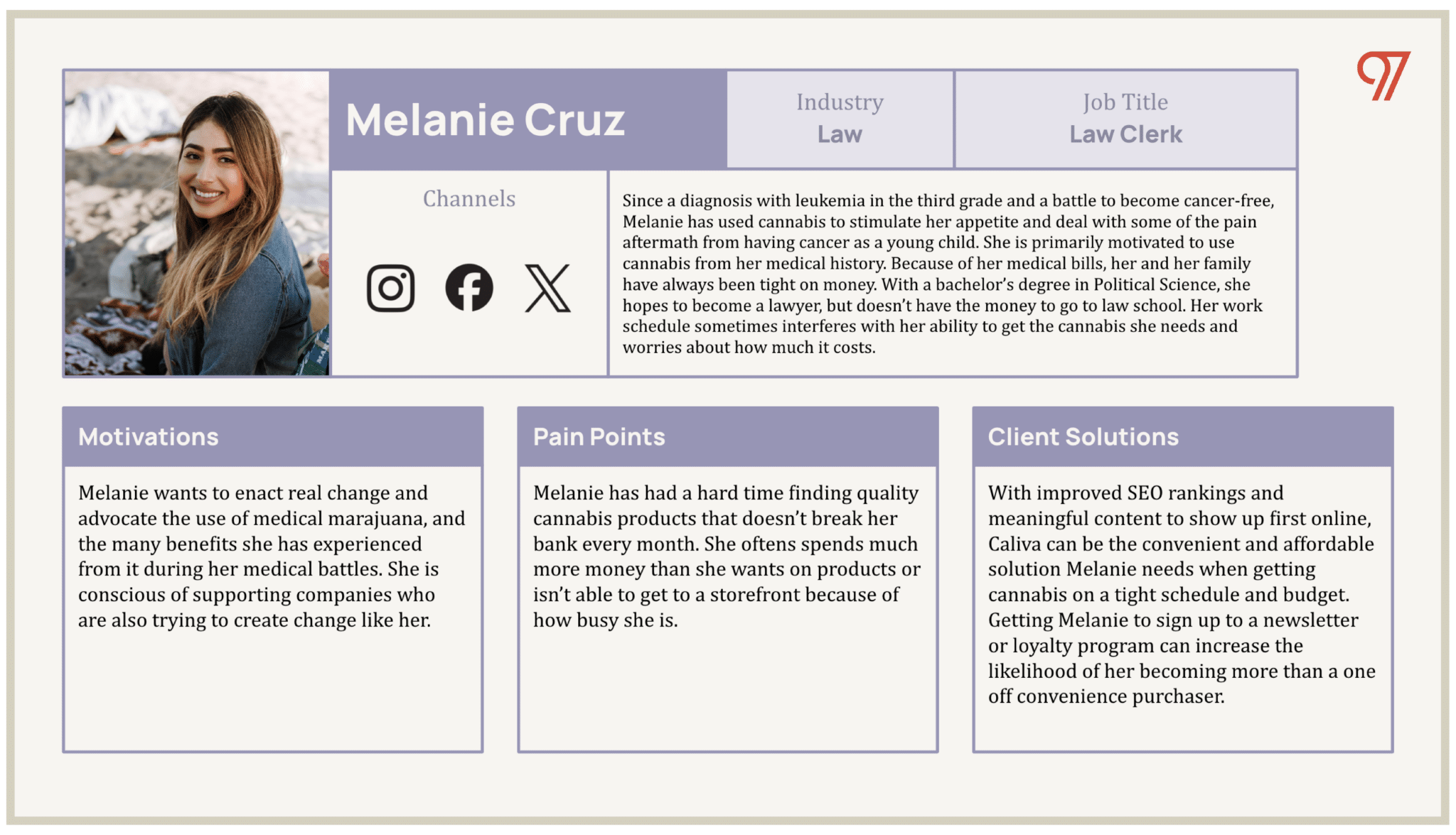
Common Values and Motivations
Health enthusiasts are motivated to act in response to the following values. Identify which align(s) best with your chosen persona, and keep it in mind as you design your marketing campaign.
•
Prevention over cure: Rather than treating symptoms, they prefer to stay ahead of potential health issues.
•
Sustainability: Eco-conscious decisions, from packaging to sourcing, play a big role in their choices.
•
Transparency: They want to know what’s in their products, how they’re made, and that they’re ethically sourced.
•
Community connection: Many health enthusiasts enjoy being part of wellness communities, whether it’s sharing fitness goals or health tips.
Current Trends in Health and Wellness
This market is one of the most volatile. As new trends and data emerge, new products and services are created. Here are some of the most recent trends we’ve noticed.
Cleaner Eating and Sustainability: Consumers are becoming more mindful about what they’re putting in their bodies and, more than ever, how it impacts the environment. As of 2024, plant-based options are projected to grow to a market share of 20.5 billion by 2029. Additionally, more consumers are actively looking for low-sugar alternatives, choosing natural sweeteners like stevia and monk fruit over processed sugars.
Wearable Technology: Fitness tech is a massive hit, especially with younger consumers. Wearables that track everything from heart rate to sleep cycles are surging in popularity. In fact, the global market for wearables is expected to reach 56.82 billion by 2029, as more consumers turn to data-driven health solutions to optimize their well-being.
Mindfulness and Mental Health: Consumers are placing more emphasis on mental wellness, incorporating practices like meditation, yoga, and even cryotherapy into their routines. This trend is on track with the rising popularity of stress-relief methods, as more people explore ways to manage burnout and mental fatigue. Digital detoxes—cutting back on screen time—are also on the rise.
Personalized Wellness: The era of "one-size-fits-all" health solutions is fading. More consumers are investing in personalized wellness products, from DNA-based nutrition plans to customized supplements. This trend reflects the growing demand for tailored solutions that match individual needs, a space projected to grow significantly over the next few years.
Cleaner Eating and Sustainability: Consumers are becoming more mindful about what they’re putting in their bodies and, more than ever, how it impacts the environment. As of 2024, plant-based options are projected to grow to a market share of 20.5 billion by 2029. Additionally, more consumers are actively looking for low-sugar alternatives, choosing natural sweeteners like stevia and monk fruit over processed sugars.
Wearable Technology: Fitness tech is a massive hit, especially with younger consumers. Wearables that track everything from heart rate to sleep cycles are surging in popularity. In fact, the global market for wearables is expected to reach 56.82 billion by 2029, as more consumers turn to data-driven health solutions to optimize their well-being.
Mindfulness and Mental Health: Consumers are placing more emphasis on mental wellness, incorporating practices like meditation, yoga, and even cryotherapy into their routines. This trend is on track with the rising popularity of stress-relief methods, as more people explore ways to manage burnout and mental fatigue. Digital detoxes—cutting back on screen time—are also on the rise.
Personalized Wellness: The era of "one-size-fits-all" health solutions is fading. More consumers are investing in personalized wellness products, from DNA-based nutrition plans to customized supplements. This trend reflects the growing demand for tailored solutions that match individual needs, a space projected to grow significantly over the next few years.
Digital Marketing Strategies & Best Practices for Health Enthusiasts
You’ve outlined the WHAT— who your target audience is, plus the values and trends your marketing will speak to. Now, let’s move on to the HOW. In this section. we’ll get into
•
Content Marketing,
•
SEO,
•
Interactive UX,
•
Email Marketing,
•
Social Media, and
•
Influencer Partnerships
Content Marketing Tactics
Create value-driven, informative content that aligns with the needs and interests of health enthusiasts. Blog posts, videos, and infographics offering fitness tips, nutrition advice, or mindfulness techniques are popular in this space. Doing this will not only keep your audience engaged but also build trust. Interestingly, consumers are 131% more likely to buy from a brand immediately after they consume early-stage, educational content. Consider incorporating guides, recipes, or workout plans into your content mix to keep your audience coming back for more.


Healthy Returns for Vida with Historic Engagement and Purchase Volumes
Read more about how 97th Floor worked with Vida to design a multi-level content strategy that raked in 689% more new leads.
SEO for Health and Wellness Keywords
Optimizing your content for health and wellness-related keywords will increase your visibility in search engine results and website traffic. Even better, 39% of healthcare marketers say SEO boosted their customer retention. Conduct keyword research using tools like Google Keyword Planner or Ahrefs to identify the most relevant terms, and which will generate the highest profit. Focus on optimizing your site for mobile as well.
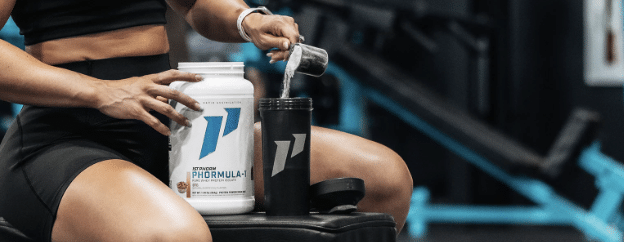

97th Floor Increases Organic Revenue by 73% for 1st Phorm
By analyzing and reevaluating target keywords, 97th Floor boosted 1st Phorm’s organic revenue by more than 70%. Check out this case study for the details.
Building an Interactive Website Experience
Health enthusiasts are like anyone else—to get them to convert, they need to be engaged. Incorporate features like quizzes, fitness trackers, or meal planners that offer a personalized experience into your website. For instance, a “Personalized Workout Plan” quiz could match users with exercises that suit their fitness goals, boosting engagement and conversion rates. This is especially relevant as 80% of consumers are more likely to do business with a company if it offers personalized experiences.
Email Campaigns
Health enthusiasts respond well to tailored messages, with personalized subject lines increasing open rates by 50%. Segment your email list based on user behavior—whether they’re new subscribers or long-term customers—and send relevant content like wellness tips, product recommendations, or discounts. Regular newsletters with valuable advice, educational content, and useful promotions will help build a lasting connection with your audience.
Social Media Platforms
79% of users look to social media to answer specific personal health-related questions. Take advantage of this trend with consistent posting and engaging with followers. Post a mix of engaging content—from short workout videos to recipes and mental wellness tips. Encourage user-generated content by asking your followers to share their own fitness journeys or tagging your brand.
Leveraging Influencer Partnerships
Depending on your goals, partnering with wellness influencers can massively increase your reach. If you choose to go this route, be sure to partner with influencers whose values align with your brand. Collaborating with the right influencers can boost credibility and brand awareness.
Challenges and Solutions in Marketing to Health Enthusiasts
Here are a few of the most common challenges in developer marketing, and quick tips for how to avoid them:
Overcoming Misinformation and Myths
Misinformation can spread like wildfire, especially in the health and wellness industry, where myths about quick fixes or "miracle" products pop up like dandelions. To combat this, work with reputable experts or organizations to share accurate information, and always back your claims with science. Correcting false narratives early on helps you build trust within your audience.
Build trust within your audience.
Compliance with Health Marketing Regulations
Working in this highly regulatory market can be tricky. The solution here is to be creative, well-researched, and honest. For example, if you’re marketing supplements, include disclaimers like “This product is not intended to diagnose, treat, cure, or prevent any disease,” as required. Additionally, it's always smart to avoid making unsubstantiated claims. Using phrases like “may support immune health” instead of “cures colds” keeps you within regulatory boundaries while promoting your product.
Addressing Customer Feedback and Reviews
Customer feedback, whether positive or negative, plays a huge role in shaping your brand’s reputation. Make sure to respond to reviews promptly and professionally. Consumers are more likely to trust a business that responds to all its reviews, including negative ones. Addressing concerns shows that you’re engaged and willing to improve, which can turn negative experiences into positive opportunities.
We hope you’ve enjoyed our guide to marketing to health enthusiasts! Good luck as you tackle the market.
We hope you’ve enjoyed our guide to marketing to health enthusiasts! Good luck as you tackle the market.


